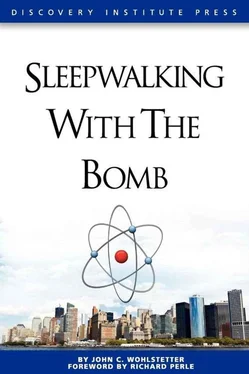John Wohlstetter - Sleepwalking with the Bomb
Здесь есть возможность читать онлайн «John Wohlstetter - Sleepwalking with the Bomb» весь текст электронной книги совершенно бесплатно (целиком полную версию без сокращений). В некоторых случаях можно слушать аудио, скачать через торрент в формате fb2 и присутствует краткое содержание. Город: Seattle, Год выпуска: 2012, ISBN: 2012, Издательство: Discovery Institute Press, Жанр: История, military, Политика, Публицистика, на английском языке. Описание произведения, (предисловие) а так же отзывы посетителей доступны на портале библиотеки ЛибКат.
- Название:Sleepwalking with the Bomb
- Автор:
- Издательство:Discovery Institute Press
- Жанр:
- Год:2012
- Город:Seattle
- ISBN:978-1-93659-906-6
- Рейтинг книги:3 / 5. Голосов: 1
-
Избранное:Добавить в избранное
- Отзывы:
-
Ваша оценка:
- 60
- 1
- 2
- 3
- 4
- 5
Sleepwalking with the Bomb: краткое содержание, описание и аннотация
Предлагаем к чтению аннотацию, описание, краткое содержание или предисловие (зависит от того, что написал сам автор книги «Sleepwalking with the Bomb»). Если вы не нашли необходимую информацию о книге — напишите в комментариях, мы постараемся отыскать её.
RICHARD PERLE, Resident Fellow, American Enterprise Institute and Assistant Secretary of Defense, 1981–1987 Sleepwalking with the Bomb
Sleepwalking with the Bomb — читать онлайн бесплатно полную книгу (весь текст) целиком
Ниже представлен текст книги, разбитый по страницам. Система сохранения места последней прочитанной страницы, позволяет с удобством читать онлайн бесплатно книгу «Sleepwalking with the Bomb», без необходимости каждый раз заново искать на чём Вы остановились. Поставьте закладку, и сможете в любой момент перейти на страницу, на которой закончили чтение.
Интервал:
Закладка:
In the wake of this experience it was natural to try to avoid making the same error—underestimating Saddam—again. The pendulum swung in the reverse direction: in 2003 we made the opposite error of overestimation, remembering not only our failure in 1990 but also Iraq’s serial lies and evasions when UN inspectors diligently tried to uncover WMD facilities in the ensuing decade.
In retrospect it is astonishing that we relied on sparse and stale intelligence—some of it from a single source of dubious reliability—to launch a major war. Yet “everyone knew” that CIA director George Tenet’s “slam dunk”—the assertion that Iraq still had WMD stockpiles in 2002—was correct. Only six senators asked to review the full intelligence assessment, which contained caveats not stressed in the summary document, before casting a vote to go to war. That our belief was sincere is established by our troops bringing cumbersome protective gear into Iraq, which hampered their movements.
After taking Baghdad on April 9, 2003, we did discover suspended programs for chemical and biological weapons. Lost in the furor over missing stockpiles was the distinction that the weapons programs were not terminated, and were capable of being restarted on short notice. Years after the war—after the WMD mess had done immense and irreparable political damage to the Bush administration—the interrogator who had debriefed the captured Iraqi dictator for months told 60 Minutes that Saddam admitted intending to restart his WMD programs once inspectors declared him fully disarmed.
A vast cultural gulf yawns between the point of view of the West and that of Saddam—his was the overwhelming desire of a Stalinist tyrant not to be seen as caving in to demands made by America. Even knowing that a second war was inevitable and that his regime would be toppled Saddam preferred such a fate to the humiliation of backing down. Mideast cultures, many of which stress the importance of not losing face, seem also to have played a role in Saddam’s actions—and the U.S. failure to predict them.
This cultural gap can result—and did in the Iraqi case—in behavior that to us seems spectacularly irrational. After all, Saddam need merely have complied with the United Nations Security Council’s unanimous request to let in the inspectors and fully cooperate—after destroying his stockpile. He would have faced a UN inspector markedly less aggressive than his two 1990s predecessors and with far more limited powers that required UN approval. Saddam could have slipped out of the sanctions regime with help from his two protectors on the Security Council, Russia and France.
The potential damage from the human tendency to overcorrect can spread far. In his memoir, former vice president Dick Cheney describes recommending in 2007 that the United States bomb Syria’s reactor; all President Bush’s other advisers argued against the bombing, citing the massive 2003 intelligence failure in Iraq. It was left to Israel to do the job. U.S. intelligence later concluded that Syria had been within at most months of starting the reactor, which then would have been able to produce enough nuclear fuel to make one or two atom bombs per year.
A Look at Nuclear Surprise
THERE ARE numerous examples of nuclear intelligence failures; successful predictions are rare. Russia’s first nuclear explosion, in 1949, caught the United States by surprise—intelligence estimates published days after the blast placed the probable Russian A-bomb test date five years later. Similarly unexpected were China’s 1964 blast and India’s 1974 “peaceful” nuclear explosion. As to the latter the consensus among U.S. intelligence experts—in 1973—was that India would not explode a nuclear device. And in 1981—even after Israel had destroyed the Iraqi reactor that was to be loaded with weapons-grade fuel—U.S. intelligence and diplomatic officials refused to concede that Saddam had been running a nuclear weapons program.
Western observers had noted Pakistan’s nuclear progress since the 1970s, but had not predicted the timing of its actual manufacture of a nuclear weapon. But analysts were caught by surprise when Pakistan conducted its first test in 1998, after India’s second test (also unexpected by U.S. intelligence)—this time, of a weaponized bomb (a missile war-head).
South Africa clandestinely developed a nuclear weapon in the 1970s and 1980s with Israeli assistance. North Korea’s clandestine nuclear program, begun in 1981, was only unmasked more than a decade later. In 2002 North Korean diplomats told the U.S. that it had built a nuclear device, but no one in the West knew the assertion to be true until Pyongyang’s underground test in 2006.
The summer of 1998 was not a felicitous one for U.S. intelligence officials. In July Iran tested its first intermediate-range ballistic missile, a step CIA director George Tenet had told Congress months earlier was 5 to 10 years away. Weeks later officials were sandbagged again. On August 24 witnesses from the U.S. intelligence community told Oklahoma Republican Senator James Inhofe that North Korea was an estimated two to three years from acquiring a multistage rocket capability. Just seven days later North Korea test-fired a multistage rocket. Another possible nuclear intelligence surprise was reported in 2012 by a leading German newspaper: that our intelligence agencies cannot definitively decide whether North Korea conducted two low-yield nuclear tests in 2010.
If Roberta Wohlstetter’s work teaches policy makers today anything, it is to be modest—very modest—about what intelligence can reveal. Getting reliable intelligence from a closed society is extremely difficult under the best of circumstances. Given the blizzard of intelligence signals from all over the globe pouring into our capacious collection centers 24 hours a day, separating signals from noise—and assembling them into a coherent whole—is even harder. Actually making decisions that incorporate inconvenient and uncomfortable assumptions is always a daunting task.
More often than not, on major strategic intelligence issues, our guesses will likely be wrong. This is especially true as to pendulum swings—the United States is focused on not repeating Iraq II while forgetting Iraq I, inevitably interpreting intelligence through the lenses of its own biases. Thus the United States is probably being too optimistic as to Iran’s likely milestone dates en route to nuclear weapons capability.
It is no criticism of intelligence officials as such to observe this. The human tendencies Roberta Wohlstetter identified behind Pearl Harbor’s intelligence failure persist in every generation. To date, only Israel has shown the fortitude to act far enough in advance to prevent certain Mideast nuclear efforts from bearing fruit. Perhaps this is because Israelis consider action a matter of elemental survival. The United States sees it as a matter of regional foreign policy—a viewpoint we may come to deeply regret.
The Seventh Lesson of nuclear-age history—INTELLIGENCE CANNOT RELIABLY PREDICT WHEN CLOSED SOCIETIES GO NUCLEAR—may be the hardest to absorb. As the UN concludes that Iran pursues nuclear-weapon-related activities, the official U.S. position remains that Iran does not have a weapons program. This likely is policy driving intelligence, else the U.S. could face irresistible pressure to act militarily, having promised that Iran will not get a nuclear weapon.
Ironically, deeply flawed intelligence drove Iraq policy in 2003. There the reliance was on prior evidence that was years out of date, thought compelling at the time. In that case, past history drove assumptions among analysts and policymakers alike. “Everyone knew” it was a “slam dunk” that Saddam still had WMD stockpiles. In fact, he had chemical and biological WMD programs that had been suspended, but could have been rapidly restarted.
Читать дальшеИнтервал:
Закладка:
Похожие книги на «Sleepwalking with the Bomb»
Представляем Вашему вниманию похожие книги на «Sleepwalking with the Bomb» списком для выбора. Мы отобрали схожую по названию и смыслу литературу в надежде предоставить читателям больше вариантов отыскать новые, интересные, ещё непрочитанные произведения.
Обсуждение, отзывы о книге «Sleepwalking with the Bomb» и просто собственные мнения читателей. Оставьте ваши комментарии, напишите, что Вы думаете о произведении, его смысле или главных героях. Укажите что конкретно понравилось, а что нет, и почему Вы так считаете.












